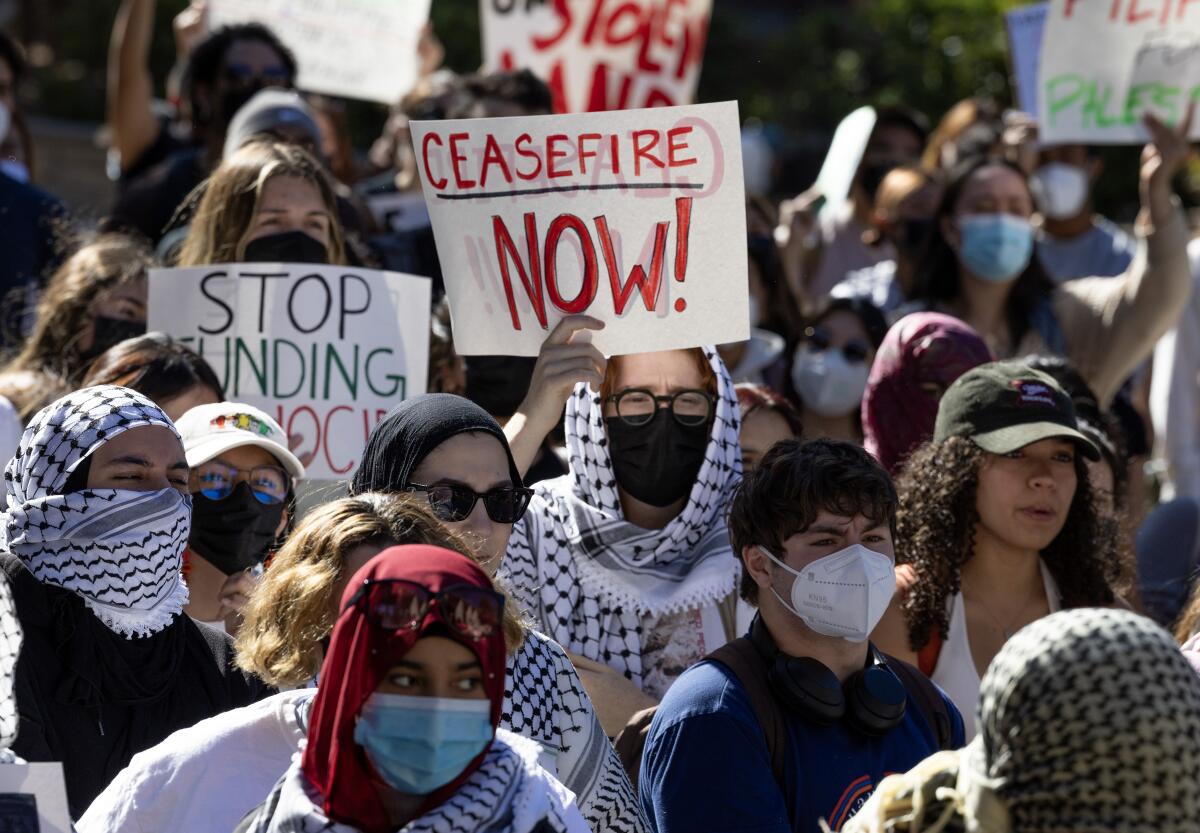Don’t cancel U.S. college students with strong views on Israel and Gaza. Encourage complexity

- Share via
Campuses across the nation are debating what is and isn’t free speech. CEOs and online trolls are canceling young people whose positions they consider hateful. Pro-Israel and pro-Palestinian faculty are taking sides. Students are hollering at administrators to do the same.
I am a lecturer in rhetoric at San Diego State University. Our biggest problem on campuses isn’t apathy, equity or AI. It’s that we aren’t teaching kids to grapple with complex ideas.
I don’t just mean they lack the ability for analytical thinking or deep focus — though these are real and troubling issues — but that young people today do not know how to figure out what they think. They know how to summarize.
Don’t blame the kids, or even social media. Their unnuanced arguments are a flaw of our education system. But the urgency of the Israel-Hamas conflict presents an opportunity to encourage young people to understand complex issues and articulate thoughtful positions on them.
In my class, I often introduce my students to F. Scott Fitzgerald’s definition of intelligence: the ability to consider conflicting ideas and not lose your mind.
As a secular Jewish woman, I can be both broken-hearted over the 1,200 Israelis killed (and the 200-plus hostages who were being held) in the Oct. 7 Hamas attack, and also grieve for the more than 13,000 Palestinians killed in Israel’s retaliation. As an analytical thinker, I must concede that I cannot understand a quality of pain that would cause members of Hamas to kidnap and assault young women, or storm houses and slaughter families — just like I cannot entirely fathom how generational trauma of the Holocaust can ignite thousands of Israelis to dehumanize their neighbors, bomb innocent civilians and cut off their access to basic human needs.
After drawing on reliable sources, cross-checking media and inviting diverse perspectives, I arrived at Team Human. I want Jewish people to have a safe place to call home, but I cannot be complicit if that creates an unsafe space for others.
Embracing the complexity changes the conversation. And opens it up. Most often, however, this begins in the uncomfortable place of listening.
Obviously, we can’t allow hate speech or ignorance to proliferate on college campuses. It’s important we understand the dangers of otherness in our rhetoric. But right now, when young people have strong opinions about a global issue, we should be careful not to instill in them a fear of speaking up.
Rather, we educators need to step up. We can challenge students to understand the multidimensionality of the conversation and to learn to apply these skills to issues in their lives.
We need to help them — and the rest of society — move beyond the binary. If we set up guidelines for people to feel safe, such as agreeing that calling out the Israeli government isn’t automatically antisemitic, but saying we must rid Israel of Jews sure is hateful, we might begin to move beyond the black-and-white thinking that has poisoned domestic and international politics.
That’s not an easy task. I recently had to get past my biases and assumptions to teach one of my own students. She had written an essay — more of a rant — about why all Americans should side with Palestinians. Despite the sting of her words implying that for Palestinians to be free, Jews must leave Israel, my job was not to shut her down but to help her express her opinion clearly in a multidimensional way.
Instead of excoriating, failing or canceling her, I posed questions designed to help her think more deeply about her stance. I encouraged her to understand her biases and assumptions, add factual, peer-reviewed evidence and acknowledge the other side.
Educators can learn from our students’ passion and curiosity for the world and teach them how to digest complex global issues. What’s dangerous are the simplistic arguments — the one-dimensional ones we see all over social media that disregard years of turbulence and peace accords, or Hamas’ doctrine to end Israel, the dubious role of Britain in the post-World War II creation of Israel, the far-right leadership in Israel that citizens had been protesting for months leading up to the Oct. 7 attack and Israel’s decades-long oppression of Palestinians.
We know what happens when we begin to believe singular perspectives — we need look no further than the U.S. Capitol on Jan. 6, 2021.
Regardless of our personal perspectives, educators have to help young people understand complexities as campuses see a rise in antisemitism and Islamophobia. Even simple things, such as noting differences between a Zionist and a Jew, or Hamas and a Palestinian. Just think if we taught students about the depth of trauma for Palestinians and Israelis, Jews and Muslims.
Can we hear the outrage of youth and allow it to introduce more nuance into our own beliefs? Instead of canceling young people for having opinions, let’s invite them to speak so we can listen. Conversations exposing different perspectives will be uncomfortable. But they also might move us beyond our biases before we get into one more turbulent American election cycle.
Michele Bigley is a San Diego-based educator and writer.
More to Read
A cure for the common opinion
Get thought-provoking perspectives with our weekly newsletter.
You may occasionally receive promotional content from the Los Angeles Times.









